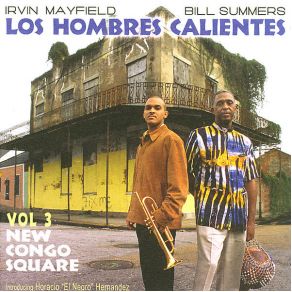Los Hombres Calientes, Vol. 3: New Congo Square
Download links and information about Los Hombres Calientes, Vol. 3: New Congo Square by Los Hombres Calientes. This album was released in 2001 and it belongs to Hip Hop/R&B, Soul, Jazz, Latin genres. It contains 23 tracks with total duration of 01:18:37 minutes.

|
|
|---|---|
| Artist: | Los Hombres Calientes |
| Release date: | 2001 |
| Genre: | Hip Hop/R&B, Soul, Jazz, Latin |
| Tracks: | 23 |
| Duration: | 01:18:37 |
| Buy it NOW at: | |
| Buy on iTunes $9.99 | |
Tracks
[Edit]| No. | Title | Length |
|---|---|---|
| 1. | Foforo Fo Firl | 4:55 |
| 2. | Intro | 0:06 |
| 3. | Brother Runnin' (Mark's Groove, Pt. 1) | 4:47 |
| 4. | Brother Gettin' Caught (Mark's Groove, Pt. 2) | 3:23 |
| 5. | Fantizias de Samba | 3:59 |
| 6. | New Second Line (Mardi Gras 2001) | 7:19 |
| 7. | Jah Rastafari | 3:13 |
| 8. | New Bus Stop (For Curtis Mayfield) | 5:24 |
| 9. | El Negro, Pt. 1 | 0:32 |
| 10. | El Negro, Pt. 2 | 3:33 |
| 11. | El Negro, Pt. 3 | 3:07 |
| 12. | Dominicanos | 0:37 |
| 13. | Corcovado/Nocturnal Low Moan | 3:33 |
| 14. | Africa N.O. (Ed's Groove) | 3:13 |
| 15. | Sentimientos | 7:53 |
| 16. | Nyabingi | 1:13 |
| 17. | I Shot the Sheriff | 3:56 |
| 18. | Bandera | 2:39 |
| 19. | Digidall | 4:38 |
| 20. | Warrior Suite, Pt. 1 | 2:10 |
| 21. | Warrior Suite, Pt. 2 | 2:19 |
| 22. | Warrior Suite, Pt. 3 | 1:10 |
| 23. | Call It What You Want | 4:58 |
Details
[Edit]This is the third album from Los Hombres Calientes, and the first since the departure of the group's most famous member, drummer Jason Marsalis. His absence is conspicuous from the first glance at the album cover, which is graced only by the two remaining hombres, trumpeter Irvin Mayfield and percussionist Bill Summers. In small print reads, "Introducing Horacio 'El Negro' Hernandez," the new drummer, who needs no introduction to serious jazz fans, as he's become one of the most sought-after Latin and straight-ahead players on the scene. Because Los Hombres Calientes earned such tremendous critical acclaim with their previous record, a personnel change could be seen as threatening to their momentum. But Hernandez does a superb job filling the void left by Marsalis. Marsalis' departure, in addition, seems to foster more spotlight time for Mayfield, both as a player and composer. (It bears mentioning that Mayfield's writing for this group is more creative and independent-minded than the acoustic jazz he's released thus far under his own name.) The group's music has grown more ambitious, encompassing a wide variety of Latin and Caribbean influences as well as the heritage of its New Orleans home base. The intention of this album is in fact to illuminate the cultural connection between New Orleans and the other countries where the band recorded: Cuba, Jamaica, and the Dominican Republic. Putting real weight behind the maxim that music is the universal language, the band recruited a host of guest instrumentalists and vocalists from all these locales, revolving around a core band that includes bassist Edwin Livingston and pianists Victor Atkins and Ronald Markham.
While the recording locations are all listed, they are not matched with specific tracks — and as the liner notes reveal, this was a conscious decision, a further attempt to blur national boundaries and engage the listener's imagination. Perhaps there's bound to be some unevenness in such a polyglot project. The reggae portion seems a bit too obvious, with "Jah Rastafarai" chucking along for a superficial three minutes and Bob Marley's "I Shot the Sheriff" sounding like a throwaway cover. But "Nyabingi," a one-minute fragment featuring Prince Tibba on vocals and repita drum, is fascinating. So is "Dominicanos," a 30-second snippet recorded on the Dominican streets. The lengthier highlights include the tuba-driven "New Second Line," the poppy-funk Curtis Mayfield (no relation to Irvin Mayfield) tribute "New Bus Stop," and the wild vocal melange "Sentimientos." Three mini-suites also add a great deal of thematic coherence. The first is "Brother Runnin'," segueing into "Brother Gettin' Caught," both of which conjure images of a manhunt, complete with a shotgun blast, barking dogs, and furtive voices. The three-part "El Negro," ostensibly dedicated to the band's new drummer, features excellent flute work by Kent Jordan and the most modern jazz harmonies to be found on the record. And "Warrior Suite," a Bill Summers creation also in three parts, features the hypnotic voice of Pedro Martinez, backed by nothing but active percussion and huge-sounding call-and-response chants by additional vocalists. As much improvisation as the album contains, it has little to do with the often insular world of acoustic jazz. It's a big, involved production, with a big, boisterous sound and a pointed disregard for musical categories. Tellingly, the band signs off with the quasi-disco number "Call It What You Want," a manifesto of sorts. ~ David R. Adler, Rovi